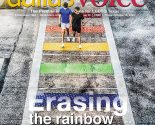
GayBarchives keeps our history on the record — and our memories alive
by Dana Piccoli
(Dana Piccoli is an award-winning writer and critic as well as the managing director of News is Out, a queer media collaborative. The following piece was published by News is Out on October 14, 2025, and appears here with permission.)
For generations, LGBTQ+ bars have been more than nightlife: they’ve been sanctuaries. Over vodka sodas and jukebox tunes, they offered connection, safety, and visibility during times where simply existing as a queer or transgender person could be dangerous. Yet, like so much of queer history, the stories of these bars often fade when the lights go out and the last song plays.
That’s where Art Smith comes in.

A veteran journalist and lifelong chronicler of queer culture, Smith is the founder of GayBarchives, a digital archive devoted to preserving the history of LGBTQ+ bars across the globe. What began as a single Facebook thread is now a living, evolving record of queer spaces past and present, one that continues to grow every day.
“It all started with a conversation with one of Atlanta’s best known bar owners, Vicki Vara of Backstreet Atlanta,” Smith recalled. “After a lengthy conversation with her and a few posts on Facebook, the topic took on a life of its own. People started reminiscing and adding ‘but we also went to the Armory, or Bulldogs, or the Pharr Library.’ Before long I had heard fond memories of dozens of gay bars [mostly in Atlanta] and decided to track down old ads and logos. That was the beginning.”
The response was immediate.
“The reaction to the logos was incredible, and the collection quickly grew to hundreds,” he said. “As we speak, my Library of Logos is approaching 5500 [domestic and international] and will be released in a new slideshow video later this year.”
What started as a nostalgic project during the early days of the COVID-19 pandemic has become serious preservation work. “As far as the images are concerned, I usually select one or two per bar that are iconic and represent the bar best to their [former] patrons,” Smith explained. “With the older bars this can be challenging due to limited access to images and ads, or the fact that some bars back then never really had logos.”
Beyond the logos, GayBarchives thrives on community storytelling.
“Our FB group is an open forum with nearly 17,000 members and growing,” Smith said. “Virtually anyone can post their memories, comments and stories there.”
While Smith occasionally challenges remarks or invites feedback from other members, he avoids being overly restrictive “Regarding the hundreds of video interviews, I have conducted I only ‘edit’ them to add images or remove technical errors and background sounds. Our gay bar history belongs to all of us, not just me.”
Smith’s work has uncovered some unexpected discoveries.
“Probably the biggest surprise was that the first widely-recognized gay bar was located on the French Riviera,” Smith said. “Known as Zanzibar, it opened in 1885 and continued operating at that location until 2010. A 125-year run is incredible for any business, let alone a gay bar in Cannes, France. I believe the space is a gelato shop today.”
The first gay bar Smith was able to identify in the U.S. was in New York City. Located in the basement of Pfaff’s Steakhouse on Broadway, this space was frequented by Walt Whitman and operated in the 1850s and 1860s, but was not as widely known by the general public.
“The same building was later home to the well-known David Mancuso Loft, a hotspot for gay parties starting in the 1970s.”
Smith’s drive goes beyond nostalgia. “Our efforts to document the stories of the bars, cafes and nightclubs that helped build our community and fight for our rights has been largely untold,” he said. “Even the stories about the iconic venues [think Stonewall and Coopers Donuts] are largely inaccurate. We endeavor to get the stories from multiple sources and present them in a way that provides a more complete picture.”
Smith sees GayBarchives as a bridge between generations. “By providing the information in a publicly-available format we help spread the word to a greater audience and we help inform the younger generations about what came before them,” Smith said. “Just like hearing tales of the adventures of your family ancestors gives you more insight into your family dynamic, these stories help our younger LGBTQ+ members relate to our struggles and appreciate how far we have come.”
Given the current political climate here and abroad, Smith shared that many younger queers are realizing that these bars and venues are our safe havens and community centers. “Newer bar owners are taking notice and helping preserve our history. I am delighted to be part of that movement,” he said.
Looking ahead, Smith wants to see GayBarchives grow into a global network of collaboration.
“My biggest dream is that we are able to establish alliances with as many organizations as possible so that we can expand our reach and bring these stories to an even greater global audience,” he said. “We welcome input and participation from all of the LGBTQ+ chambers of commerce, media organizations, business guilds, bar owners and the general public to inform us about the places we may have missed and add details to the ones we have documented.”
Smith also urges queer historians to share their findings and bring wider attention to the history they’ve worked so hard to document. “We invite pride organizations to connect with us and tell their members about the work we [and other historians] are doing. Ultimately I would like to be able to create the world’s largest collection of the logos and stories of our special places.”
That vision has already earned recognition. Smith has been honored by Pride365 as a Champion and by CultureDash as a Culturally Significant Educator. His work has been featured by PBS stations in Atlanta and San Diego, and he’s been interviewed by outlets including The Advocate, RevryTV, and Queer News Tonight.
For Smith, who has spent decades in LGBTQ+ media — as a journalist, editor, publisher, producer, and show host —GayBarchives is both an act of preservation and of gratitude.
Since launching the project in 2019, he has archived nearly 5,500 logos and conducted more than 200 interviews. “Ultimately,” he said, “I want GayBarchives to remind people that our bars were never just places to drink. They were places to belong.”
SPECIAL REPORT
Volume 27
Issue 9








